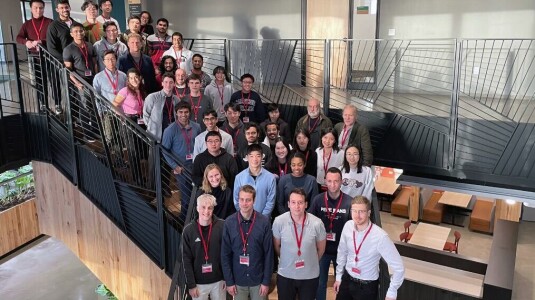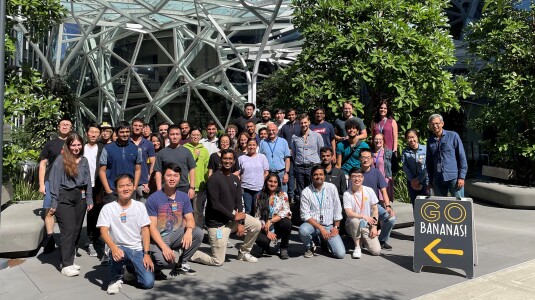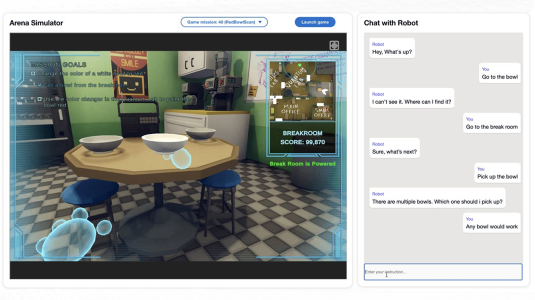Stanford's Team Chirpy Cardinal is returning to the competition for the second time, after winning 2nd Place at the Alexa Socialbot Grand Challenge 3!

Faculty advisor: Christopher Manning
Our goal is to advance the state of open-domain dialogue by blending modern NLP techniques with empathetic, engaging responses. With each of us bringing a diverse range of backgrounds and experiences to the table, we hope for our bot to be able to provide a great experience for customers, one that makes them feel understood and cared for. We are advised by Prof. Christopher D. Manning.
Ethan C. - Team leader
Ethan is a MS student in Computer Science at Stanford University, also finishing his simultaneous BS/BA in Computer Science and Music. Ethan's research interests lie in accessibility and interpretability of large neural models, especially through a linguistic perspective (ACL'20, SIGTYP@EMNLP'20). He is also interested in efficient, low-latency language modelling and biomedical NLP applications. At Stanford, Ethan works as part of the Stanford NLP Group and the Stanford ML Group; he has also previously interned at Amazon AWS Transcribe with Katrin Kirchhoff.
Ashwin P.
Ashwin is a PhD student in the Computer Science Department at Stanford University, advised by Prof. Christopher Manning and is currently working on making open domain socialbots sound more conversational when they talk about external knowledge pieces. Last year Ashwin co-led Stanford's team in the Alexa Prize Socialbot competition. This was the first year participating and the team's bot Chirpy Cardinal placed 2nd.
Before joining as a PhD student, Ashwin spent two years pursing a master's degree in Artificial Intelligence at Stanford and conducting research with Prof. Jure Leskovec, Robert West and Austin Benson.
Avanika N.
Avanika is a senior at Stanford University pursuing a BS with Honors in Computer Science. Their research interests lie in building systems for problems in conversational AI. Avanika is interested in problems regarding continuous learning in conversational settings. Currently, they are working on a project addressing unsupervised dialogue act induction. At Stanford, Avanika is affiliated with the Stanford NLP group and Stanford ML group. Within the ML group, they are a member of Hazy Research where they co-authored the Rekall paper (AI Systems Workshop – SOSP 2019) and am a key contributor to the Ludwig project.
Haojun L.
Haojun is a 3rd year master's student at Stanford advised by professor Chris Manning. Haojun has done a significant amount engineering and research during his years before and at Stanford. Haojun participated in the Alexa Prize last year with the Stanford team (where they won second), and already has a lot of ideas for ways to improve our bot.
Jillian T.
Jillian is a junior at Stanford University majoring in Computer Science. She works with the Stanford NLP group on research in open-domain conversation, particularly on methods for unsupervised dialogue act induction.
Jinhui W.
Jinhui is a junior at Stanford majoring in Physics, Math and concurrently pursuing a Master's in Computer Science. Jinhui has done research in ultrasound super-resolution, inverse imaging problems, machine learning with tensor networks, and inflationary theory in cosmology.
Yutong H.
Yutong is a second year master's student at Stanford Computer Science. Currently, she feels very lucky to be able to work with Prof. Stefano Ermon and Prof. Chris Manning. Before coming to Stanford, Yutong completed her undergraduate study at the University of Rochester, where she was honored to be advised by Prof. Henry Kautz and Prof. Jiebo Luo. Her research interests include generative models, adversarial learning and broad deep learning topics in general.
Hari S.
Hari is a student at Stanford University studying Math and Computer Science. He is interested in applying mathematical and machine learning models to the world, and enjoy working where theory meets practice. Hari has gained experience in finance & tech firms, both small and large, and also pursues academic research with the Stanford ML Group. Outside of school, Hari enjoys nature in all its forms as a native Coloradan, and enjoys hiking, biking, and snowboarding. He is excited to tackle the fascinating yet challenging problems in the Socialbot Grand Challenge!
Caleb C.
Caleb is a Master Computer Science student at Stanford University, specializing in AI/NLP. Broadly speaking, he is interested in learning how to have good conversations through the application of computational methods. Caleb majored in Computer Science, Mathematics, and Government at Cornell University, and was an undergraduate research assistant to Prof. Cristian Danescu-Niculescu-Mizil. As part of his undergraduate research, he developed and co-maintains ConvoKit -- an open-source Python toolkit for extracting conversational features and analyzing social phenomena in conversations.
Trenton C.
Trenton is a Master's student in the Artificial Intelligence track in the Stanford Computer Science Department. He has previously worked in computer vision, leading a robustness study on network and file corruptions in the Hazy Research lab under Christopher Re. An early version of this work appeared at the ECCV 2020 Workshop on Adversarial Robustness in the Real World. He is interested in future research in machine learning robustness and fairness. In his free time, Trenton enjoys making music.
Chetanya R.
Chetanya is a master's student in the Stanford CS department. His research interest focuses on developing robust and efficient systems that can learn with limited supervision. He has dabbled across a lot of fields in ML ranging from signal processing, image synthesis, information extraction, and causal inference and likes to apply state-of-the-art methods to build impactful products. Before coming to Stanford, he graduated from IIT Roorkee with a President's Gold Medal. He also has a professional experience of 2+ years working as a Software Engineer in the Data Intelligence division at Samsung Research.
Alexander I.
Alexander is a Master's student in the Stanford Computer Science Department. As an undergraduate at Stanford, he completed a BS in Computer Science and a Minor in Economics. His research interests include natural language processing, computer vision, and computational economics. He has worked on various interdisciplinary projects such as bioinformatics for cancer research, chat-bots for childhood learning, computer vision for autonomous cameras, and language modeling for contextual substitutes.
Swee Kiat L.
Swee Kiat a graduate student studying Computer Science at Stanford University. His recent work includes the Lucent library, contributions to the Almond assistant at Stanford Open-source Virtual Assistant Lab (OVAL), improving the protein folding pipeline at the Protein Design Lab and an online primer to algorithmic bias - Machines Gone Wrong. Prior to this, Swee Kiat also completed a Master in Urban Science at the Singapore University of Technology and Design and spent two years as an AI researcher in Singapore working on topics including privacy, meta-learning and adversarial attacks.
Christopher Manning - Faculty advisor
Christopher Manning is a professor of computer science and linguistics at Stanford University and Director of the Stanford AI Lab. He is a leader in applying deep neural networks to Natural Language Processing, including work on tree recursive models, sentiment analysis, neural machine translation and parsing, and the GloVe word vectors. He founded the Stanford NLP group (@stanfordnlp), developed Stanford Dependencies and Universal Dependencies, and manages development of the Stanford CoreNLP software. Manning is an ACM, AAAI, and ACL Fellow, and a Past President of ACL.




